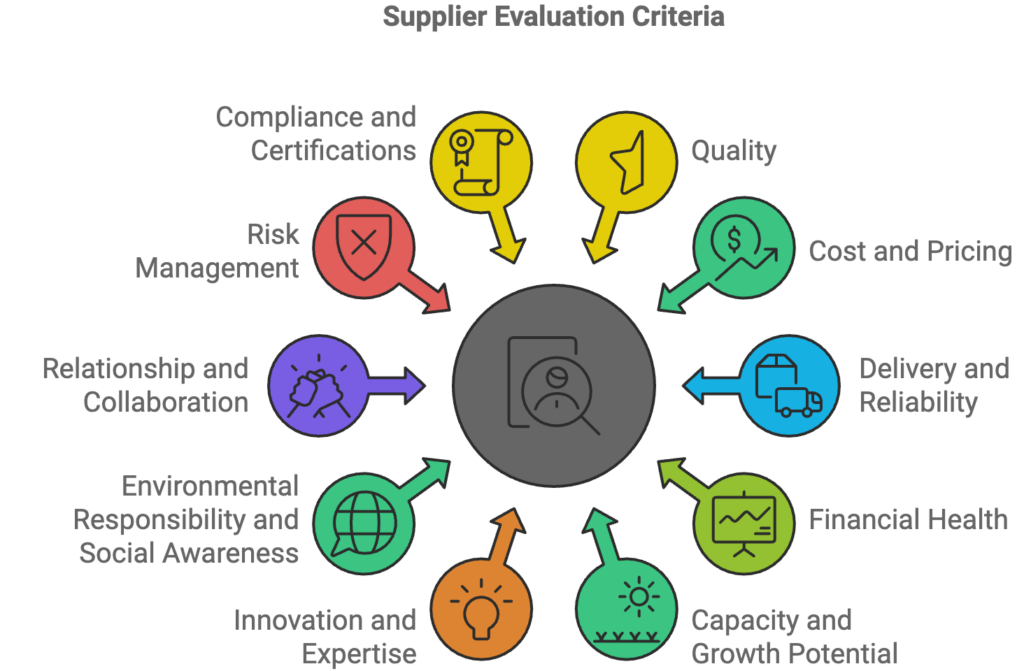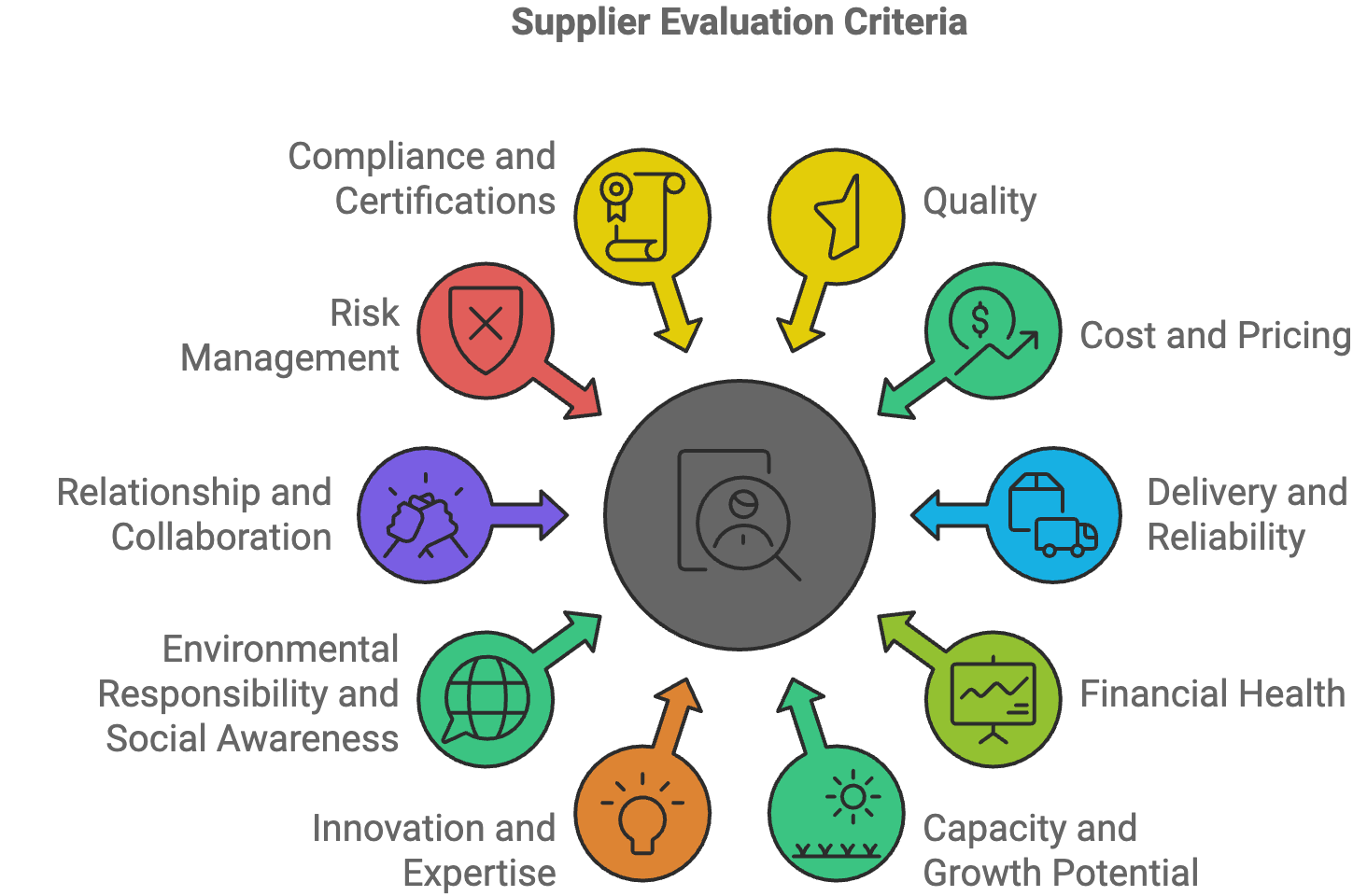In strategic sourcing, identifying the top supplier is vital for businesses aiming to improve their procurement processes and create strong supply chains. By carefully assessing potential suppliers against these important benchmarks, companies can make well-informed decisions that boost efficiency, lower risks, and build long-term partnerships aligned with their strategic aims.
| Key Points |
|---|
| • Quality, cost, and delivery reliability are fundamental criteria for supplier evaluation |
| • Financial health and growth potential ensure long-term partnership success |
| • Innovation, environmental responsibility, and compliance are vital for future-ready supply chains |
| • Good communication and cultural alignment foster successful collaborations |
| • A thorough evaluation process is key for strategic sourcing success |
The Value of Strategic Sourcing
Strategic sourcing is a methodical approach to procurement that goes beyond simple cost reduction. It involves a detailed analysis of spending patterns, market conditions, and supplier abilities to find the most suitable vendors for an organization’s needs. By implementing a strategic sourcing process, companies can achieve significant savings, boost quality, and improve overall supply chain performance.
Supplier Evaluation in Strategic Sourcing
Supplier evaluation is a core component of effective strategic sourcing. It allows organizations to objectively assess potential vendors and select those that best fit their business goals. A well-designed evaluation process helps reduce risks, ensure consistent quality, and promote ongoing improvement in the supply chain.

Now, let’s examine the top 10 supplier evaluation criteria that are essential for successful strategic sourcing:
1. Quality
The quality of products or services provided by a supplier is paramount. Poor quality can result in higher costs, production delays, and harm to a company’s reputation. When evaluating suppliers, consider:
- Quality certifications (e.g., ISO 9001)
- History of consistent quality
- Compliance with industry-specific standards
- Quality control processes and measures
2. Cost and Pricing
While cost shouldn’t be the only deciding factor, it remains an important consideration in supplier evaluation. Consider more than just the initial price:
- Total cost of ownership (TCO)
- Pricing structures and models
- Potential for cost reductions over time
- Value-added services included in the pricing
3. Delivery and Reliability
A supplier’s ability to deliver products or services on time and in full is essential for smooth operations. Evaluate:
- On-time delivery performance
- Order fulfillment rates
- Flexibility in meeting changing demands
- Ability to handle urgent orders or unexpected volume increases
4. Financial Health
A supplier’s financial condition is a key indicator of their long-term viability as a business partner. Consider:
- Financial statements and reports
- Credit ratings and payment history
- Profitability and growth trends
- Investments in research and development
5. Capacity and Growth Potential
As businesses expand and change, their suppliers must be able to keep up. Evaluate:
- Current production capacity
- Ability to adjust based on demand fluctuations
- Investment in new technologies and equipment
- Plans for expansion or facility upgrades
6. Innovation and Expertise
Suppliers that show commitment to innovation can provide a competitive advantage. Look for:
- Investment in research and development
- History of introducing new technologies or processes
- Industry expertise and thought leadership
- Willingness to collaborate on new product development
7. Environmental Responsibility and Social Awareness
In today’s business environment, ethical and environmentally friendly practices are increasingly important. Evaluate:
- Environmental policies and initiatives
- Compliance with labor laws and human rights standards
- Corporate social responsibility programs
- Sustainability certifications (e.g., ISO 14001)
8. Relationship and Collaboration
Strong supplier relationships can lead to better outcomes for both parties. Consider:
- Communication style and responsiveness
- Willingness to share information and collaborate
- Alignment of business values and culture
- History of successful partnerships
9. Risk Management
Identifying and reducing potential risks is crucial for maintaining a resilient supply chain. Assess:
- Business continuity plans
- Geopolitical risks associated with supplier locations
- Cybersecurity measures and data protection policies
- Compliance with industry-specific regulations
10. Compliance and Certifications
Ensuring that suppliers follow relevant legal and regulatory requirements is essential. Look for:
- Industry-specific certifications and compliance records
- Adherence to quality management standards
- Compliance with data protection regulations (e.g., GDPR)
- Commitment to ongoing improvement in compliance areas
Conclusion
The top 10 supplier evaluation criteria for strategic sourcing cover a wide range of factors that go beyond simple cost considerations. By thoroughly assessing potential suppliers against these criteria, organizations can build stronger, more resilient supply chains that drive long-term success. Implementing a thorough and well-structured evaluation process is essential for identifying the most suitable suppliers and building partnerships that align with strategic business objectives.



